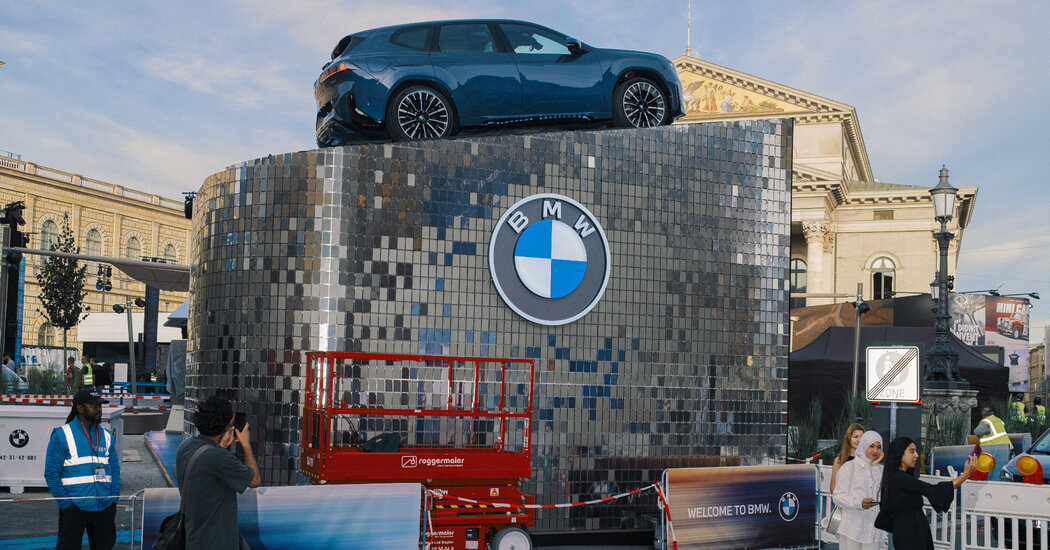
Spooked by plunging profits and job cuts across the auto industry, Germany’s chancellor is insisting that the European Union allow car manufacturers, rather than regulators in Brussels, to determine how best to reach the bloc’s goal of slashing carbon emissions.
After meeting with the heads of Germany’s carmakers and other stakeholders in the auto industry, Chancellor Friedrich Merz vowed on Thursday to urge the European Union to back off a policy prohibiting all new vehicles sold after 2035 from producing carbon emissions. The regulation has been widely interpreted as a ban on combustion engines.
“I will be pushing for decisions to be taken in the European Union that will enable comprehensive technological advancement and climate neutrality,” Mr. Merz told reporters. “Not with a date on the calendar that we cannot achieve, that is unrealistic, but with a clear perspective that also opens up the necessary future prospects for companies in Germany.”
Stung by a drop in demand from customers in China, the world’s largest auto market, German automakers have seen sales of their cars decline steadily in recent years. President Trump’s tariffs have only made things worse.
Porsche on Thursday joined BMW and Mercedes in reporting weaker sales in China, where customers prefer less expensive local brands like BYD and Xiaomi. On Wednesday, BMW’s shares plunged 7 percent after it cut its forecast for profit and cash flow, citing the U.S. tariffs.
The pain is being felt in communities across Germany, where the auto industry shed some 51,500 jobs from June 2024 to 2025, according to a study from EY. Industry groups have begun warning that further losses could worsen the political divide in the country.
As part of Germany’s efforts to shore up the industry and make electric vehicles more attractive, Mr. Merz announced plans for an incentive worth 3 billion euros, or about $3.5 billion, aimed at helping low-income households purchase electric cars, starting next year and running for three years.
Mr. Merz and industry leaders repeatedly stressed their support for the E.U.’s goal of moving toward fully electric mobility. But German automakers argue that customers are not yet convinced of the technology and that charging infrastructure across the 27-member bloc is not yet sufficient to relieve concerns about running out of power while on the road.
The German automakers are arguing for the rule to be loosened to allow for hybrid vehicles — those with both a combustion and an electric engine — along with combustion engines that run on environmentally friendly fuels.
Hildegard Müller, president of the German Association of the Automotive Industry, pointed out that 70 percent of jobs in Germany’s auto industry are linked to exports. At the same time, different countries are favoring different technologies, she said.
“If we want to maintain our sales figures and thus also our employment levels here, we must be in a position to offer various types of climate-neutral technologies for that reason alone,” Ms. Müller said.
Germany will have to persuade other E.U. member states to back its position and is hoping that member countries with large car industries, including the Czech Republic, France, Hungary, Italy and Spain, will join them.
But last month, more than 150 companies involved in the electric vehicle sector, including Samsung and Uber and the carmakers Volvo and Polestar, signed an open letter urging Ursula von der Leyen, president of the E.U.’s executive arm, the European Commission, to remain committed to the 2035 goal.
“Our companies and sectors have committed hundreds of billions of euros in new investment, already creating over 150,000 new jobs, from battery gigafactories in France and Germany, to new or retooled car plants in Slovakia and Belgium,” the letter said.
“Delaying the 2035 target, or broadening focus after 2035 to less efficient, transitional technologies, would stall these collective steps forward, erode investor confidence, and permanently hand the advantage to global competitors,” they said.